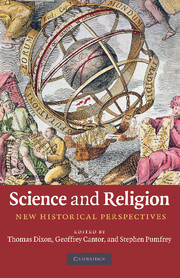Book contents
- Frontmatter
- Contents
- List of contributors
- Preface
- 1 Introduction
- PART I CATEGORIES
- PART II NARRATIVES
- 4 Religion and the changing historiography of the Scientific Revolution
- 5 The late Victorian conflict of science and religion as an event in nineteenth-century intellectual and cultural history
- 6 Islam, Christianity, and the conflict thesis
- PART III EVOLUTION AND CREATIONISM
- PART IV THE POLITICS OF PUBLISHING
- PART V WAYS FORWARD
- Select bibliography
- Index
6 - Islam, Christianity, and the conflict thesis
Published online by Cambridge University Press: 05 May 2010
- Frontmatter
- Contents
- List of contributors
- Preface
- 1 Introduction
- PART I CATEGORIES
- PART II NARRATIVES
- 4 Religion and the changing historiography of the Scientific Revolution
- 5 The late Victorian conflict of science and religion as an event in nineteenth-century intellectual and cultural history
- 6 Islam, Christianity, and the conflict thesis
- PART III EVOLUTION AND CREATIONISM
- PART IV THE POLITICS OF PUBLISHING
- PART V WAYS FORWARD
- Select bibliography
- Index
Summary
The infamous late nineteenth-century ‘conflict thesis’ focussed primarily on alleged antagonisms between Christianity and science. However, it was the broad and comparative perspective on religion taken by these nineteenth-century accounts that differentiated them from earlier, exclusively anti-Christian polemics. The purpose of the present chapter is to highlight the important role played by ideas about Islam in the articulation of ambitious theses claiming to expose the essential relationship between science, on the one hand, and a generalized category of ‘religion’, on the other.
Historical studies of Islam, Christianity, philosophy, and science came together in the nineteenth century in a way that was made possible by the fashioning of ‘science and religion’ as a coherent field of enquiry. A close look at nineteenth-century accounts of the conflict between science and religion shows that Islam and Christianity were often interlinked, and that the narrative accounts of one often complemented the other. Modern historiographies of Christianity and Islam, and their relationships with science, have been closely intertwined.
There were two main – and contradictory – versions of the history of Islamic science as it featured in the narratives of conflict: first, as an intellectually progressive religion that was a true friend of science; and second, as the most backward and anti-scientific religion. In both cases Islam served to accentuate claims about Christianity. Earlier histories of science and religion often adopted the first of these positions, praising Islam for its progressiveness. This was the consequence of the rising scholarly interest in European medieval thought.
- Type
- Chapter
- Information
- Science and ReligionNew Historical Perspectives, pp. 111 - 130Publisher: Cambridge University PressPrint publication year: 2010
- 1
- Cited by



